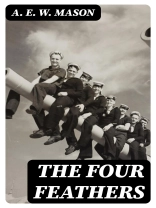A. E. W. Mason’s ‘The Four Feathers’ is a gripping tale set against the backdrop of British colonialism and military adventure in the late 19th century. Written in a vivid narrative style that blends rich descriptions with psychological depth, the novel explores themes of honor, courage, and the complexities of friendship. The story follows Harry Feversham, a young British officer who, shamed by his resignation before a military campaign in Sudan, embarks on a journey of redemption, which is symbolized by the titular four feathers—tokens of cowardice bestowed upon him by his peers. Mason’s work captures the tumultuous spirit of the British Empire, revealing the personal and collective struggles of individuals caught in a web of societal expectations and personal morality. A. E. W. Mason, an English writer born in 1865, was not only a novelist but also a playwright and a prominent journalist who drew from his own experiences in the military and his travels to inform his writing. His exposure to the complexities of human emotions and the socio-political landscape of his time played a pivotal role in shaping the narrative arc of ‘The Four Feathers’, reflecting both the anxieties and aspirations of a generation confronted with issues of duty and sacrifice. This classic novel is a must-read for those interested in historical fiction and the dynamics of the British Empire. It offers profound insights into the themes of bravery and honor, making it a timeless exploration of personal redemption that resonates with contemporary readers. Mason’s narrative craftsmanship and the novel’s moral complexities invite readers to reflect on their own definitions of courage and loyalty.
About the author
Alfred Edward Woodley Mason, commonly referred to as A. E. W. Mason, is a distinguished figure in the literary world of the early 20th century. Born on May 7th, 1865, in London, Mason was not only an author but also a politician, illustrating a multidimensional career. His writing is characterized by a synthesis of adventure, patriotism, and an exploration of human character and its transformations under duress. Mason’s service as a Liberal MP for Coventry from 1906 to 1910 interweaved his political ideals with his literary works, providing a unique societal insight.
Mason is widely remembered for his masterpiece ‘The Four Feathers’ (1902), a novel that delves into themes of bravery, honor, and the British Empire’s military ethos. This book stands out as an exemplary work within Mason’s extensive bibliography, which includes tales of mystery and detective fables, such as ‘At the Villa Rose’ (1910) and ‘The House of the Arrow’ (1924), employing a suave blend of suspense and logical deduction. His literary style is effusive with rich descriptions, complex characters, and intricate plots that often reflect the imperialistic views and societal norms of his time. Mason continued to write until his death on November 22, 1948, leaving behind a formidable legacy as a storyteller with an enduring impact on adventure and historical fiction genres.












